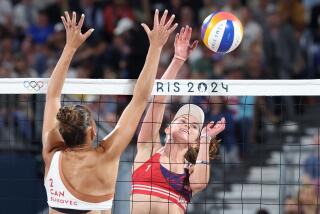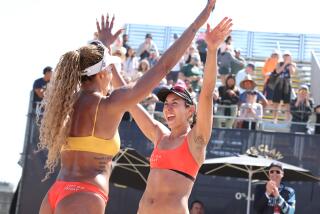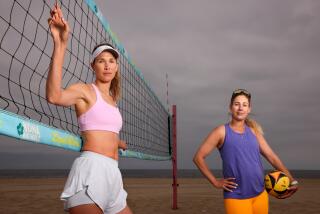Fan-free tournament gives AVP Tour stop in Long Beach a different feel
On the eve of her sport’s return to action, beach volleyball player Alix Klineman went to bed Friday night with butterflies in her stomach. Her teammate, two-time Olympic medalist April Ross, felt the type of nervous adrenaline that usually doesn’t accompany a standard AVP tournament.
Of course, little was standard about this weekend’s Monster Hydro Cup, the first of three consecutive tournaments in the AVP’s Champions Cup Series, a three-weekend event in Long Beach replacing the tour’s original schedule amid the coronavirus outbreak.
Only players and essential tour personnel were allowed near the man-made courts erected in the Long Beach Convention Center parking lots. Players were kept separated between matches and sheltered as much as possible between points. They were thankful to have the sport come back, breaking up what some feared could have been a near-yearlong layoff leading up to the 2021 Olympics, but all too aware of the conditions surrounding its return.
“After we won, there were no fans cheering,” said Ross, who with Klineman won the women’s bracket as the top-seeded team. Instead, “all the staff [surrounding the court] was cheering as loud as they could. That was nice.”
But, without a doubt, another reminder of how little felt normal.
Before the event, the AVP tested all players and staff members (each came back negative). At the start of each day, players had to remain in their car and fill out a symptom questionnaire on their phone. Once cleared, they had to wear orange bands around their wrist or ankle at all times, including on the court.
Yet, once the matches began, the level of competition hardly suffered.
“Everyone looked ready,” said Nick Lucena, who won the men’s bracket with teammate Phil Dalhausser. “Maybe not in peak form, but today it was a high level of play.”
The AVP’s planning was meticulous. Chief operating officer Al Lau said tour officials created guidelines for everything from catering (meals were prepackaged, water bottles strategically placed out ahead of time) to sanitation (which included the wiping down of balls between points) to even the spread-out furniture arrangements in the players’ tents.
“You have to go through the mindset of, yes you know this person and you can wave at a distance maybe, but nobody is really talking to anyone,” Lau said, adding: “Literally, you’re just going from point A to point B.”
Those were sacrifices players made to return to the court. When the pandemic arrived in March, beach volleyball was in the final stages of its Olympic qualifying process, which is organized by its international governing body, FIVB.
Four months later, the path to Tokyo remains uncertain — FIVB is hoping to stage more international World Tour events in coming months, but the unpredictability of the pandemic means they are far from a guarantee — making the return of this weekend’s competition a relief, even though AVP events don’t count toward Olympic points.
“It’s been nine months since our last tournament, which is a really long time,” said Klineman, who with Ross is ranked second in the Olympic qualification standings and expected to reach Tokyo. “We wanted to take advantage of this time, treat the training really seriously, use this kind of like a mini training camp … to remember how to compete again. We don’t know the next time we’re going to have this chance.”
More to Read
Go beyond the scoreboard
Get the latest on L.A.'s teams in the daily Sports Report newsletter.
You may occasionally receive promotional content from the Los Angeles Times.











